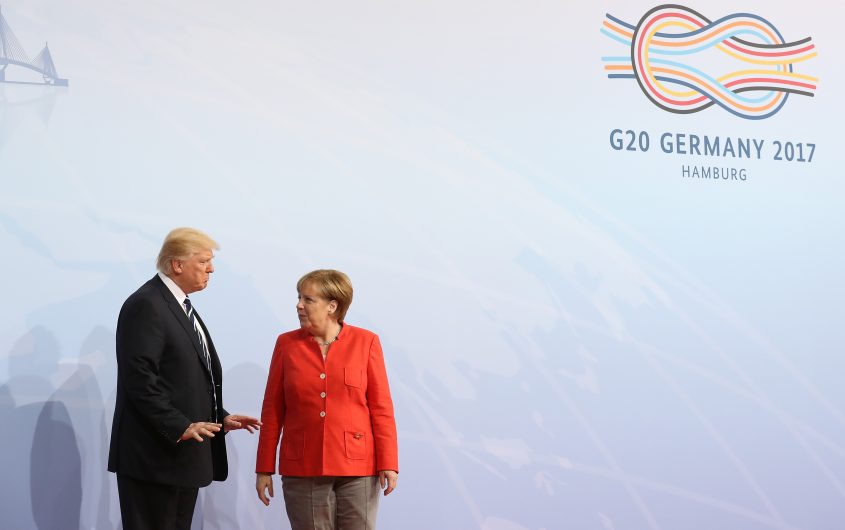
Sean Gallup/Getty Images
A Tale of Two Communiqués

Peter S. Rashish
Vice President; Director, Geoeconomics Program
Peter S. Rashish, who counts over 30 years of experience counseling corporations, think tanks, foundations, and international organizations on transatlantic trade and economic strategy, is Vice President and Director of the Geoeconomics Program at AICGS. He also writes The Wider Atlantic blog.
Mr. Rashish has served as Vice President for Europe and Eurasia at the U.S. Chamber of Commerce, where he spearheaded the Chamber’s advocacy ahead of the launch of the Transatlantic Trade and Investment Partnership. Previously, Mr. Rashish was a Senior Advisor for Europe at McLarty Associates, Executive Vice President of the European Institute, and a staff member and consultant at the International Energy Agency, the World Bank, UN Trade and Development, the Atlantic Council, the Bertelsmann Foundation, and the German Marshall Fund.
Mr. Rashish has testified before the House Financial Services Subcommittee on International Monetary Policy and Trade and the House Foreign Affairs Subcommittee on Europe and Eurasia and has advised three U.S. presidential campaigns. He has been a featured speaker at the Munich Security Conference, the Aspen Ideas Festival, and the European Forum Alpbach and is a member of the Board of Directors of the Jean Monnet Institute in Paris and a Senior Advisor to the European Policy Centre in Brussels. His commentaries have been published in The New York Times, the Financial Times, The Wall Street Journal, Foreign Policy, and The National Interest, and he has appeared on PBS, CNBC, CNN, NPR, and the BBC.
He earned a BA from Harvard College and an MPhil in international relations from Oxford University. He speaks French, German, Italian, and Spanish.
During Richard Nixon’s historic 1972 visit to China, the U.S. president reportedly asked Premier Zhou Enlai what he thought about the impact of the French Revolution on history, to which the Chinese leader responded “It’s too soon to tell.” Something similar holds for the trade policy conclusions of the July 7-8 G20 summit in Hamburg. The ambiguity of its final declaration has a created a “tale of two communiqués”: the summit was either a strong affirmation of common ground or a worrying prelude to conflicts to come.
On the one hand, the G20 leaders say they will “keep markets open…and continue to fight protectionism.” The leaders also “underline the crucial role of the rules-based international trading system” and pledge to “further improve the functioning of the WTO.” This hardly sounds like an attempt to disrupt the 70-year-old global economic order.
At the same time, this year’s communiqué notes “the importance of reciprocal and mutually advantageous trade and investment frameworks” and recognizes “the role of legitimate trade defense instruments.” If this were a soccer match, the term “reciprocal” would cause a free trade referee to assign a yellow card: while there is nothing wrong with creating reciprocal opportunities, trying to guarantee reciprocal results could justify market-distorting interventions in commercial exchanges. And although the use of defenses such as anti-dumping measures against unfair trading practices is well-grounded in trade law, what is “legitimate” may be in the eye of the beholder.
Given the competing forces it reflects, what is likely to tip this unsteady seesaw of a communiqué one way or the other? The answer may lie in how the G20—in particular the U.S. and the EU—fulfills its promise “to better enable our people to seize the opportunities and benefits of economic globalization.”
While the Trump administration may be misguided about the causes and remedies for the U.S. trade deficit and a few other matters of trade policy, it appears to be right about one important thing: the challenge presented by China’s state-capitalist economic model.
As U.S. Trade Representative Robert Lighthizer has asserted, China clearly maintains “non-economic” production capacity in steel and other sectors that is a disguised jobs program. There are also reasons to be concerned about the impacts of Chinese investment in U.S. and European technology sectors, and to be wary of granting China market-economy status in the World Trade Organization (WTO).
If the G20 wants to make globalization fairer, encouraging China to play by transatlantic rules of the road is one way to do that. But the Trump administration seems tempted to deal with the distortions arising from China’s economic model unilaterally through tariffs and other counter-measures, even if that involved going around what the WTO allows.
There is a better way, but it will take patience and diplomacy in equal measure: relaunching the Transatlantic Trade and Investment Partnership (TTIP) negotiations between the U.S. and the EU, this time with a stronger focus on rules, principles, and codes of conduct.
If the two transatlantic economic powerhouses that account for almost half of the global economy agreed on a common framework for what state-owned companies can and cannot do at home and abroad, that could lead to a virtuous imitation effect setting the stage for progress globally.
U.S. Commerce Secretary Wilbur Ross said in May that “it makes sense to continue TTIP negotiations and to work towards a solution that increases overall trade.” Chancellor Merkel said this month that “for me a Trans-Atlantic agreement remains on the daily agenda.” The stage is set.








